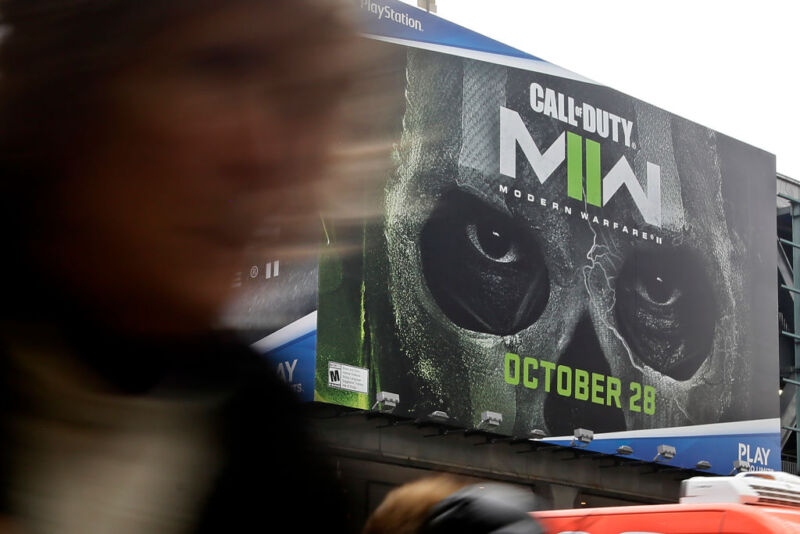Microsoft sued by Call of Duty gamers opposing Activision merger

About two weeks after the Federal Trade Commission filed a lawsuit to block Microsoft’s acquisition of Activision Blizzard, 10 gamers from California, New Jersey, and New Mexico have banded together to file a lawsuit against Microsoft.
Echoing many of the FTC’s concerns, the gamers are hoping to pressure and prevent Microsoft from closing “the largest tech deal ever in the video gaming market” and, thus, swallowing up its biggest competitor in the game industry.
In their complaint, plaintiffs describe Activision Blizzard as a crucial rival that drives industry-wide innovation and price competition. If the acquisition is allowed, the public could suffer loss and damages because Microsoft would supposedly wield more market power than it already has—suddenly granted “the ability to foreclose rivals, limit output, reduce consumer choice, raise prices, and further inhibit competition.”
Under the Clayton Antitrust Act, consumers have similar rights as industry competitors to oppose acquisitions like this one, allowing courts to weigh anti-competitive harms raised by consumers. The gamers are suing Microsoft for allegedly violating antitrust law, and are deeply worried that their favorite games could soon see prices spike, while games could decrease in overall quality. If the deal goes through, they allege that Microsoft would be positioned to hoard the best talent and most popular games to potentially gain “far-outsized market power.”
A Microsoft spokesperson told Ars that the gamers’ worst fears are not warranted.
“This deal will expand competition and create more opportunities for gamers and game developers as we seek to bring more games to more people,” a Microsoft spokesperson told Ars.
But the FTC seems to agree more with gamers, pointing in a press release to “Microsoft’s record of acquiring and using valuable gaming content to suppress competition from rival consoles.”
“Microsoft has already shown that it can and will withhold content from its gaming rivals,” Holly Vedova, the FTC’s Bureau of Competition director, warned in the press release.
Loyal gamers fear potential monopoly
The people suing bring a unique perspective to the debate over Microsoft’s acquisition of Activision, a deal that Microsoft hopes to close in 2023. In their complaint, they say that gamers are particularly vulnerable to price hikes because Microsoft knows that they’re unlikely to substitute other games for their favorites. That means Microsoft could take beloved titles— like Call of Duty games, which all plaintiffs play—and cut off access to platforms or services outside of Microsoft’s gaming ecosystem.
Microsoft already publicly stated that it would make Call of Duty available on rival consoles from Sony and Nintendo for the next 10 years. But like the FTC, plaintiffs say they’ve seen Microsoft make similar promises before, only to go back on their word once an acquisition is finalized, which it did with Starfield after acquiring ZeniMax Media in 2020.
Plaintiffs also argue that just because Microsoft promises to make a game available on other consoles or gaming systems, that doesn’t mean that it will be available at the same time, of the same quality, or have the same features and upgrades.
Consider, the complaint suggests, if Microsoft used popular Activision titles to boost its dominant position and push competitors out of the emerging cloud-based gaming market—essentially choking out competition in a market before it can even start to flourish. Likewise, any exclusive perks on massively popular games offered only within Microsoft’s gaming ecosystem could drive users away from competing platforms, with the complaint alleging that Microsoft could even “have the ability and incentive to engage in strategies to foreclose Sony.”
One way that game content quality could decrease, the complaint says, is through the gaming industry’s ongoing consolidations. The deal could place Microsoft in a position to attract all the best game developers, potentially starving independent game studios from accessing top talents. In this scenario, the complaint alleges that the industry could suffer from reduced wages, limited mobility, and worse working conditions—with Microsoft in a powerful position to set industry standards.
Ars could not immediately reach lawyers representing gamers suing, but the complaint says that plaintiffs believe that the better future for the gaming industry is one where Activision Blizzard continues existing as a separate market entity, stoking industry-wide competition as one of Microsoft’s only major rivals.
“The competition in the industry brought by Activision Blizzard must be preserved to ensure that the next generation of video game innovation and value are enhanced through competition, not stifled through consolidation,” their complaint states.
Gamers suing have asked a US federal court to declare that Microsoft’s acquisition of Activision Blizzard violates antitrust law. Following in the footsteps of the FTC, they’re fighting to ensure that the merger will be permanently blocked.
https://arstechnica.com/?p=1906278